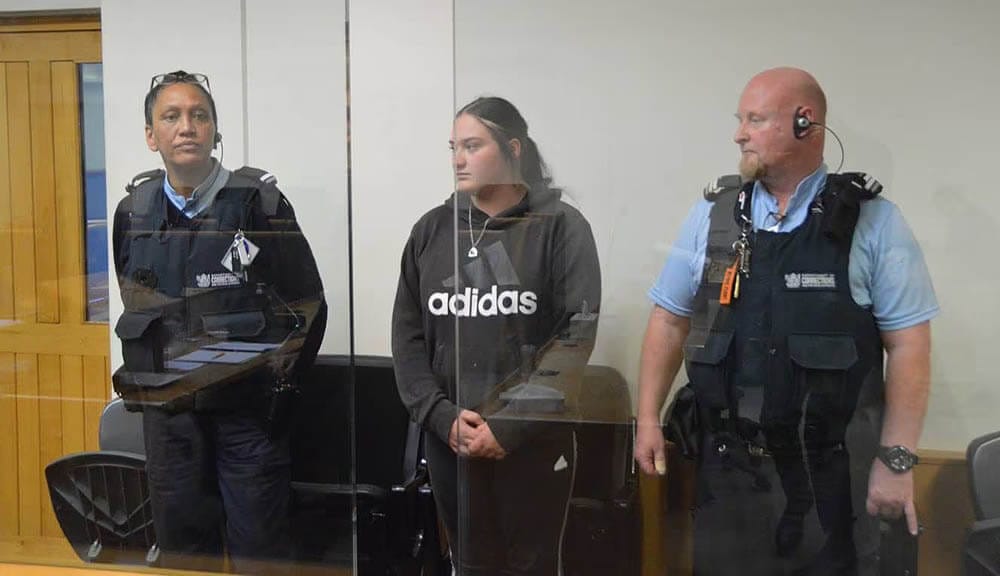Table of Contents
This tragic story not only illustrates the dangers of cannabis, but also highlights the leniency of our sentencing…
A woman smoked “20 bongs” of marijuana before getting behind the wheel and killing a pedestrian. She then filmed the aftermath of the crash and posted it to TikTok! She continued to use cannabis while on bail and had not engaged in restorative justice.
Despite all this, she was given a very lenient sentence of just three years and four months in prison (likely to serve less than this), and disqualified from driving for only four years.
Patrizia Stephens, having consumed excessive amounts of marijuana, was travelling at least 75km/h in a 50km/h zone when she approached a red traffic light at a busy Palmerston North intersection. Despite there being a car in front, she changed lanes and drove around the stationary vehicle at speed. Stephens then collided with another vehicle, veered into a pole and then travelled out of control for approximately another 100m. Her car mounted the footpath and hit a pedestrian, crushing him against a building. Tragically, he died at the scene.
Patrizia Stephens continued to use cannabis while she was on bail pending sentence, clearly showing no remorse. Justice Cheryl Gwyn noted that Stephens had not engaged in restorative justice, after pulling out at the last moment.
But despite this, Justice Gwyn allowed her a 15 per cent discount to her end sentence.
The victim’s family had wanted Stephens to get at least 10 years in prison, and we would agree with this sentiment.
Cannabis is a very harmful drug, and our sentencing is often far too lenient.

Research shows conclusively that drug use to increases the likelihood of accidents and deaths on the roads.
In a study done in New Zealand by six Australian health researchers, it found that habitual users of marijuana have about 10 times the risk of car crash injury or death compared to infrequent or non-users. Those users who crashed had smoked marijuana within three hours of their accidents.
More than half the drivers taken to hospital after causing a crash were found to have drugs in their system, a 2012 study found. The Ministry of Transport study used blood samples taken from 453 drivers who caused crashes. Drugs were detected in the systems of 258 drivers, analysis by the Institute of Environmental Science and Research (ESR) found.
An Automobile Association study found that people on drugs are causing more fatal crashes than those behind the wheel drunk.
**Note – This post was written by Family First staff writers.
Read the full story of Patrizia Stephens, by Melissa Nightingale for NZ Herald:
A teenager who smoked “20 bongs” of marijuana before getting behind the wheel and hitting and killing a pedestrian filmed the aftermath of the crash and posted it to TikTok.
Family of the man who was killed, 59-year-old Tom Martin, mentioned the footage in court this morning as his killer Patrizia Stephens, 19, was sentenced to three years and four months in prison.
“You were laughing and videoing the scene where one man was dying and another lay paralysed,” a statement read on behalf of Martin’s sister stated.
“You had the audacity to video the scene like it was something cool.
“I only hope Tom did not hear your laughter.”
Martin’s family showed the TikTok video to an NZME reporter following the hearing.
At the sentencing in the High Court at Palmerston North, Justice Cheryl Gwyn said Martin was walking home from a Palmerston North pub on October 14 last year, while Stephens, who was stoned at the time, was travelling from a car enthusiast meet-up.
She was travelling at least 75km/h in a 50km/h zone when she approached a red light at the intersection of Main St and Ruahine St.
But despite there being a car in front of Stephens that had stopped for the red light, and her backseat passenger imploring her to stop, she changed lanes and drove around the stationary vehicle at speed.
Stephens collided with another vehicle, veered into a pole and then travelled out of control for about 100m from the initial crash site.
Her car mounted the footpath and hit Martin, crushing him against a building.
The rear passenger’s door flew open and the passenger was tossed around in the back seat. When the car came to a stop, the passenger was on his back, with Martin lying on top of him inside the car.
The pair had to be removed from the vehicle by emergency services, but Martin died at the scene.
The passenger was taken to hospital with serious injuries, including breaks to his forearm, pelvis and sternum and blood in his abdominal cavity.
Stephens’ front passenger also reinjured a pre-existing knee injury.
When spoken to by police at the scene, Stephens told officers she had consumed 20 bongs of cannabis, with the last one being half an hour before the crash. A blood test revealed THC in her system.
Stephens went on to plead guilty to manslaughter and two counts of reckless driving.
At her sentencing today, she hugged her family before she was led into the dock.
She appeared emotional, periodically wiping her eyes as the victim impact statements from Martin’s family were read to the court.
In Martin’s sister’s statement, she said Stephens didn’t appear to be remorseful for her actions.
“When we saw you at your court appearance you smirked at us,” she said.
“How you could even look at the family of a man you had killed. The fact you kept staring us down that even after months of agony for us, you still have no remorse or regret.”
The woman said she had repeatedly heard that Stephens was young and that her age explained her actions.
“I remind you that you are not the victim. You cannot use any excuse for what you have done.”
Crown prosecutor Guy Carter said it was a tragedy to send a young person to prison but Stephens didn’t deserve anything more than the standard youth discount.
He said Stephens continued to use cannabis while she was on bail pending sentence, and described that as the antithesis of remorse.
She had taken no steps to address her addiction, which was at the heart of her offending, he said.
“The person who is genuinely remorseful for their behaviour, they will begin to address that behaviour,” Carter said.
“That simply isn’t the case here. Ms Stephens still has a long way to go on her journey.”
Defence lawyer Paul Murray emphasised his client’s youth and noted that while she had continued smoking cannabis, it was a maladaptive habit that she had self-reported to probation.
“She has to accept it’s galling that she’s continued in her drug use and I’m not going to endeavour to apologise or make excuses for that,” Murray said.
“For her it’s a highly addictive drug that she’s had to lean on even more … And that’s a perverse response.”
Justice Gwyn said she expected that someone who had caused the death of another person while high on the drug would have taken steps towards rehabilitation.
“A critical factor for me is your continued daily use of cannabis,” she said.
“It indicates you have not yet taken responsibility for the harm you’ve caused.
“You instead choose to avoid processing what you’ve done by smoking cannabis.”
Justice Gwyn noted that Stephens had not engaged in restorative justice, after pulling out at the last moment, but allowed her a 15 per cent discount to her end sentence for her youth before sending her to prison.
Stephens was also disqualified from driving for four years, which will commence once she has completed her jail term.
Martin’s brother, Charlie Martin, told NZME that not long before the crash his brother had started visiting a different pub, the one he was at on the night of his death, after his usual one stopped serving his favourite beer.
This meant the route he took on his walk home also changed and Charlie said he had headphones on listening to music when he walked.
Charlie, who travelled from Auckland to Palmerston north to see the spot where his brother died, said he had fond memories of playing rugby and pool with Martin.
He said the pair had “some good times”.
“He was a good guy, Tommy, so he was. He would give you anything off his back.”
Charlie had wanted Stephens to get at least 10 years in prison for “killing an innocent person walking home from the pub”.
“An 18-year-old killed a 59-year-old. That’s a joke.”









